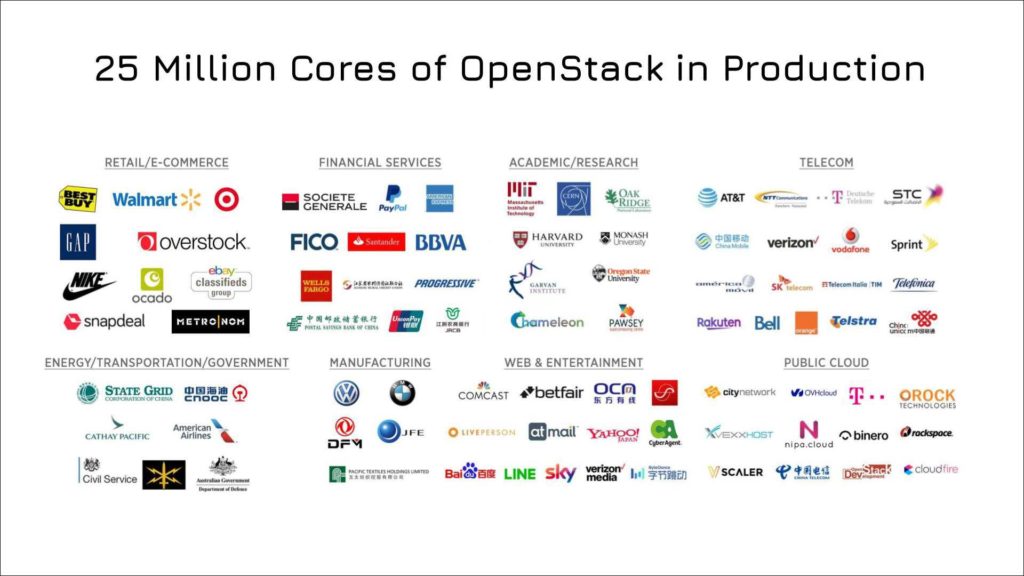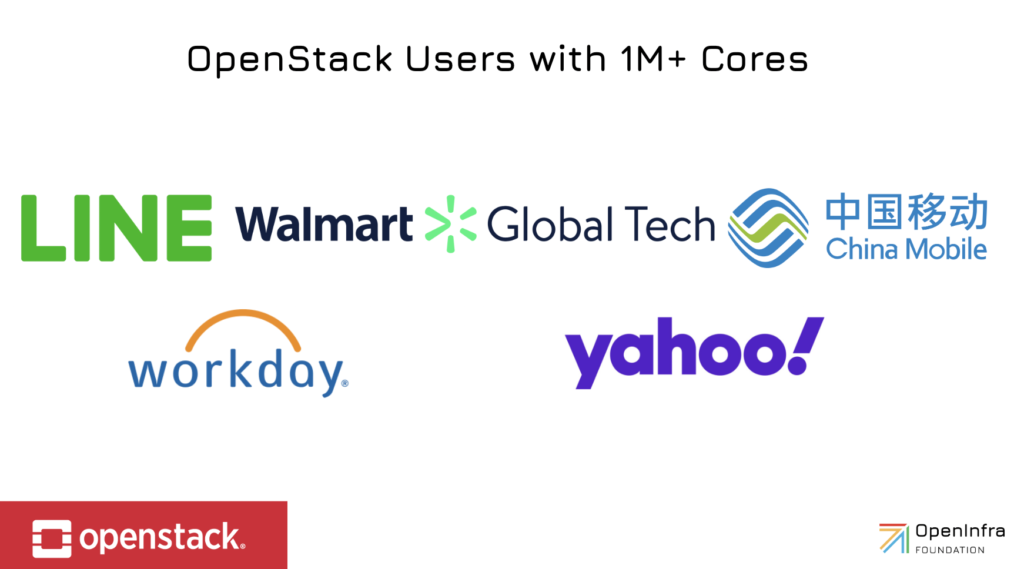OpenStack continues to be one of the most active open source communities with more than 25 million cores in production. This year, the OpenStack community continued to produce more software that is run in production. Notable highlights include:
- Wallaby: Wallaby, the 23rd release of OpenStack, was developed by over 800 contributors from 140 organizations in 45 countries. Comprised of more than 17,000 code changes, Wallaby focused on integration with other open source projects like CEPH, Kubernetes, and Prometheus. OpenStack continues to be the third most active open source project (along with the Linux kernel and Chromium).
- Xena: The Xena release brought with it better integration amongst OpenStack projects, support for advanced hardware features, and reduction of technical debt. Nova’s support for SmartNICs and ECMP routes in Neutron are a few of the hardware features now supported. Together, over 680 contributors worked in a short 25 weeks to present the 24th release of OpenStack.
- Technical Writing SIG Dissolution: After successfully migrating the docs to project repositories several releases ago, and mostly maintaining an advisory role now, the Technical Writing SIG decided to dissolve and migrate the last of their repositories to other teams. At the PTG, the Technical Writing SIG Chair met with the Technical Committee and the First Contact SIG worked out a plan to retire the Technical Writing SIG.
- Skyline: OpenStack welcomed its newest project since the addition of Adjutant in 2018! Skyline is an OpenStack dashboard built with React as an alternative to the Horizon dashboard. While not ready for production use just yet, the dashboard is engineered so that functions directly call OpenStack APIs to make maintaining the dashboard easier for developers and interactions faster and more efficient for users. This effort has been supported by the Horizon team as a future replacement once Skyline’s functionality gets closer to parity with Horizon. The Technical Committee accepted with with the caveat that Skyline with be labeled as a ‘tech preview’ until it undergoes the changes to bring it more in line with how other OpenStack services are organized and released.
- TC Stance on OpenStackClient: The Technical Committee formalized their stance on the OpenStackClient in a resolution this year. Instead of making the development of OpenStackClient a community wide goal, but still wanting to show support and stand with the OpenStackClient team, they settled on a resolution with the intention of circling back to evaluate if the OpenStack community is ready for the OpenStackClient community goal.
- IRC Network Migration: There was a change in ownership, organization structure, and policy in Freenode, the IRC network that the community has made use of for years. In response, the community discussed alternatives and settled on migrating over to a different network, but keeping IRC as the synchronous chat platform our community uses. As of late May, the OpenStack community has moved to the OFTC Network. Most teams were a part of this transition.
Get involved:
- Code: opendev.org/openstack
- IRC: OpenStack channels on OFTC
- Mailing lists: lists.openstack.org
- Website: openstack.org
MORE OPENSTACK IN PRODUCTION THAN EVER
In November 2020, the OpenStack community celebrated 15 million cores in production. Just 12 months later, over 25 million cores were recorded in the annual OpenStack User Survey, marking 66% growth compared to 2020. This growth was seen among organizations of all sizes, including seven organizations who were recording over 1 million cores in production.

Walmart, LINE, Workday, China Mobile, and Verizon Media were among the founding members of the OpenStack Million Core Club. They were recognized during the OpenInfra Live: Keynotes, celebrating their incredible scale and innovation with OpenStack.

OPENSTACK CERTIFIED ADMINISTRATOR (COA) EXAM
The Certified OpenStack Administrator exam is the only professional certification offered by the OpenInfra Foundation.
In 2021,
- COA exam vouchers were purchased: 109
- 193 students passed
Among the exam takers, students were from 29 countries, including
- United States
- United Kingdom
- Canada
- Bolivia
- China
- Columbia
- Cyprus
- Egypt
- France
- Germany
- Ghana
- Guatemala
- Hungary
- India
- Indonesia
- Mexico
- Netherlands
- Peru
- Poland
- Russia
- Saudi Arabia
- Singapore
- Spain
- Switzerland
- Thailand
- Turkey
- Uganda
- Ukraine
- Vietnam
OPENSTACK UPSTREAM INSTITUTE
The training was held twice throughout the year. The first training took place as part of the Open Source Day stand alone event held by the Anita B Foundation who also hosts the Grace Hopper Celebration. The ratio of mentors to students was very high (2:1) which yielded not only a productive day full of good discussions, but a highly specialized experience for the attendees that participated in the event. Upstream Institute was held in a one-day format where the mentors focused on sharing information about the OpenStack community including the tools and processes that contributors use on a daily basis.
The afternoon section of the training concentrated on hands-on experience where students worked on reproducing and fixing bugs in the OpenStack code base. Attendees who were able to stay for the afternoon learned how to push a code change upstream for review and several of them were able to go above and beyond. They were able to reproduce their bugs and also submit a fix to it. The training was very sucessful and we got great feedback and engagement from students.
The second training held in 2021 was also an online training that was held as part of the Open Source Day within the Grace Hopper Celebration in October. Similar to the first rendition, the training was held in one-day format with lectures in the morning and hands-on exercises in the afternoon. Again, the students worked on fixing real bugs and the more than 14 mentors made sure that attendees learned the mechanics of uploading a change for review, which is essential to be able to contribute code or documentation after the course. Four attendees pushed patches for bugs that were real fixes to OpenStack and as a result, they entered into a drawing that Grace Hopper was hosting to incentivize working on open source.
While the possibilities to hold the training were again, very limited in 2021, a group of mentors keep maintaining the course material to ensure it is up to date for every training occasion to provide the best experience to the students who joined. The content, being fully open source and available online, provides the possibility for individuals and organizations to go through it as a self-paced course or run it locally.
You can read the full 2021 OpenInfra Annual Report here!










Leave a Reply